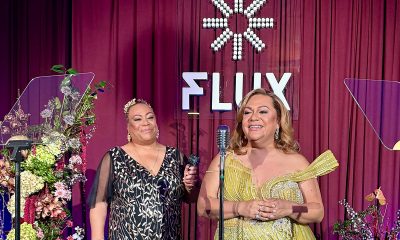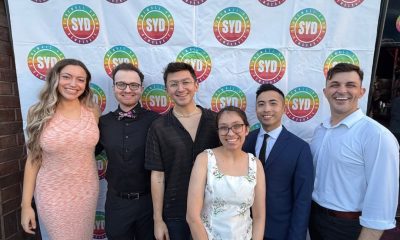West Hollywood
West Hollywood in brief- City government in action this week
Nominations for its 2024 Rainbow Key Awards, 34th Annual Toy and Food Drive, 2024 Arts Grant Program Grant Recipients and more
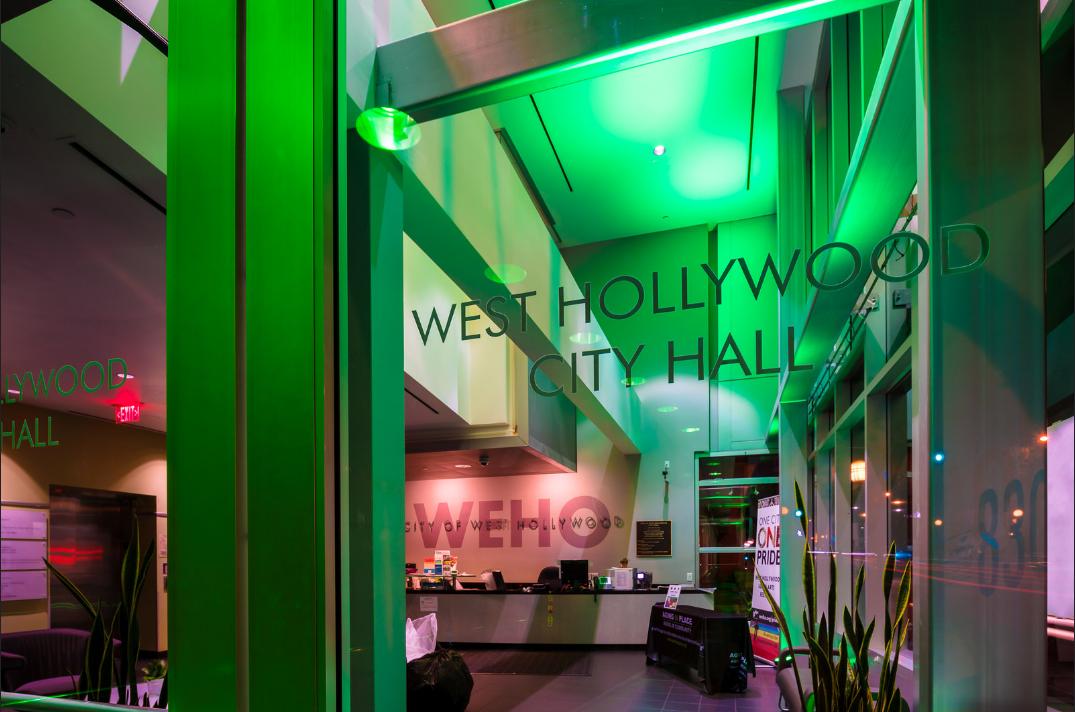
City of West Hollywood opens nominations for its 2024 Rainbow Key Awards
WEST HOLLYWOOD – The City of West Hollywood is gathering nominations for its 2024 Rainbow Key Awards. The City’s Rainbow Key Awards recognize people who have made outstanding contributions to the LGBTQ+ community.
Nominations may be submitted electronically through the City’s website at www.weho.org/rainbowkey. Nomination forms are due by 11:59 p.m. PST on Wednesday, January 31, 2024. The newly formed LGBTQ+ Commission will review nominations and present recommendations to the West Hollywood City Council. The awards presentations for 2024 Rainbow Key Awards nominees are anticipated to take place during the second half of 2024.
Since 1993, the City of West Hollywood has presented Rainbow Key Awards to individuals and groups that have gone above and beyond in their service to the LGBTQ+ community. Contributions have come in many forms, including the arts, community service, humanitarian action, sports, medicine, armed services, leadership potential, benefit to the global LGBTQ+ community, and more. Past honorees have included activists, artists, civic leaders, educators, community organizations, and many others.
The City of West Hollywood will be hosting an event for its 2023 Rainbow Key Awards presentation, which is anticipated to take place in early 2024. Additional details will be made available when the date is confirmed. Stay informed by visiting the City’s website calendar at www.weho.org/calendar and opt-in to news updates and calendar e-notifications by signing up at www.weho.org/email.
For more information, please contact Moya Márquez, City of West Hollywood Community Programs Coordinator, at (323) 848-6574 or at [email protected].
For people who are Deaf or hard of hearing, please call TTY (323) 848-6496.
West Hollywood is Informing Dog Owners about LA County Public Health Announcement Regarding Atypical Canine Infectious Respiratory Disease (aCIRD)
The City of West Hollywood is getting the word out about a recent announcement from the Los Angeles County Department of Public Health that it has received multiple reports of dogs experiencing a sudden respiratory illness of unknown origin. Symptoms for dogs include cough, nasal discharge, sneezing, and lethargy.
Related to this, the Vanderpump Dog Foundation cancelled its World Dog Day 2023 event, which had been scheduled to take place in West Hollywood Park on Saturday, December 2, 2023. The cancellation was made to ensure all necessary precautions are taken to safeguard the health and wellness of dogs. The event is anticipated to be rescheduled in 2024.
Currently, LA County Public Health is in case-finding mode to determine if and to what extent there is a new respiratory illness impacting dogs in Los Angeles County and is communicating with federal and state entities to ensure efforts are coordinated.
According to LA County Public Health, the respiratory illness impacting dogs is currently known as Atypical Canine Infectious Respiratory Disease (aCIRD). Cases are currently defined as having a negative canine respiratory PCR test panel, which tests for common viruses and bacteria identified in dogs with similar symptoms, plus one of the following clinical scenarios:
- Chronic mild to moderate respiratory infection that lasts more than six weeks that is minimally or not responsive to antibiotics;
- Chronic pneumonia that is minimally or not responsive to antibiotics; or
- Acute pneumonia that rapidly becomes severe and often leads to poor outcomes in as little as 24 to 36 hours.
Given the lack of knowledge about the cause of this disease, LA County Public Health is advising dog owners to look out for symptoms such as cough, sneezing, nasal discharge, and lethargy in their dogs. If a dog is experiencing these symptoms, owners should take the following steps:
1. Contact their pet’s veterinarian so the pet may be evaluated, and, if indicated, the appropriate tests and medications may be provided.
2. Isolate sick dogs at home for a minimum of 28 days past the first day of the onset of illness. Dogs exposed to the sick dog should quarantine at home and away from other dogs for 14 days to monitor them for signs and symptoms of illness.
3. Clean regularly and disinfect surfaces, doorknobs, keyboards, and animal equipment. To disinfect, use an EPA-registered disinfecting product or a stronger bleach solution.
4. Keep the dog home and away from day care, boarding kennels, grooming facilities, and dog parks.
5. If a dog becomes ill after being boarded or being in a facility, owners should take it to a veterinarian for evaluation and they should also notify the facility about the illness.
At this time, the City of West Hollywood will maintain regular operations and cleaning for William S. Hart Dog Park and Dog Parks at West Hollywood Park, keeping them open. Advisory information about Atypical Canine Infectious Respiratory Disease (aCIRD) will be posted in these park areas. The City will maintain close contact with LA County Public Health on this topic in the event that local officials deem additional steps should be taken.
For more information from the Los Angeles County Department of Public Health, please contact [email protected] or (213) 240-8144.
For people who are Deaf or hard of hearing, please call the City of West Hollywood’s TTY line (323) 848-6496.
City of West Hollywood to Host Winter Wonderland at West Hollywood Park
The City of West Hollywood will host its second-annual Winter Wonderland event on Saturday, December 16, 2023 from 1 p.m. to 4 p.m. at West Hollywood Park, located at 647 N. San Vicente Boulevard.
The highlight of this event is the transformation of West Hollywood Park into a picturesque Winter Wonderland with 20 tons of snow on the Great Lawn, which is snow laughing matter! The City has doubled the size of its snow zone play area, so get ready to frolic and play in a space that’s twice as grand, making this year’s event truly snow-tastic!
Two snow zones will be in place, one for ages five-and-under, and another for ages six and up. Bundle up and don your gay apparel, sweaters, gloves, and boots, hop on your sleigh and point it toward West Hollywood Park for a sweet and festive adventure full of fun and cheer! Yule be sorry if you miss it!
Additional event festivities include, crafts, holiday décor, hot cocoa and snacks, performances by community groups, a DJ spinning holiday classics, plenty of opportunities to take elfies and remember, no resting Grinch face. In case of rain, the event will move to the gymnasium inside the West Hollywood Park Aquatic and Recreation Center, located at 8750 El Tovar Place, directly adjacent to the West Hollywood Park grounds.
For more information about the City of West Hollywood’s Winter Wonderland event, please contact the City’s Recreation Services Division at (323) 848-6534 or at [email protected].
For people who are Deaf or hard of hearing, please call TTY (323) 848-6496.
City of West Hollywood Says Loud-and-Clear: ‘Don’t Drink (or Use) and Drive’
The City of West Hollywood, its City Council, and its Public Safety Commission join the West Hollywood Sheriff’s Station, local Fire Stations 7 and 8, and Block by Block Security Ambassadors in reminding community members about an important safety message during the holidays: do not drink (or use) and drive. Driving under the influence of cannabis carries the same DUI designation as alcohol.
This critical message will be the theme of an upcoming community reception Celebrating 10 Years of the City of West Hollywood’s free weekend trolley The PickUp. Launched in 2013, The PickUp is the City’s fun, flirtatious, (and free!) trolley that runs along Santa Monica Boulevard on Friday and Saturday nights from 8 p.m. to 3 a.m., on Sundays from 2 p.m. to 10 p.m., and on certain holidays. The PickUp carries people safely to and from bars, clubs, restaurants, and entertainment venues in and around the City’s Rainbow District and Center City and Eastside areas.
The PickUp Celebrating 10 Years community reception will take place on Monday, December 4, 2023 at 5:30 p.m. in the motor court adjacent to the City of West Hollywood’s Council Chambers/Public Meeting Room, located at 625 N. San Vicente Boulevard. It is free and open to the public. The reception will precede the regular meeting of the West Hollywood City Council, which will begin at 6 p.m.
Irreverent and lighthearted, The PickUp provides more than 100,000 passenger trips each year and connects people to the places in West Hollywood they want to go. When it was launched a decade ago, The PickUp was illustrated with a bright yellow palette of graphic pop-art characters. It has evolved to feature photo-based images with new typefaces, logos, and designs. Everyone enjoys a ride on The PickUp. Most importantly, it reduces driving while intoxicated and eases parking and traffic congestion. Details: www.wehopickup.com.
The City’s Cityline service offers an additional way to get around West Hollywood and to connect to the Hollywood/Highland station from 5 p.m. to 8 p.m. Mondays through Saturdays for Los Angeles Metro Rail B Line (red line) service. Details: www.weho.org/cityline. Visit www.weho.org/transit for additional information about City of West Hollywood transit programs.
There are sobering statistics from the Centers for Disease Control (CDC) about the dangers of DUI. Every day, 29 people in the United States die in motor vehicle crashes that involve an alcohol-impaired driver; more than one-million drivers are arrested yearly for driving under the influence of alcohol or narcotics; and, marijuana users were approximately 25 percent more likely to be involved in a crash than drivers with no evidence of marijuana use.
The City of West Hollywood works year-round to raise awareness about safe driving, distractions, and pedestrian safety. The City’s Drive Mindfully campaign reminds community members to embrace a mindful approach to driving. When we Drive Mindfully, we all do our part to help encourage safety in the community whether we’re driving, bicycling, or walking.
The City of West Hollywood has many bars, restaurants, lounges, nightclubs, and venues that serve alcohol. The City’s Imbibe Intelligently campaign promotes safety tips and messages regarding alcohol consumption and encourages responsibility as the City works to maintain safe establishments that are free from overconsumption of alcohol.
As the holiday season approaches, the West Hollywood Station of the Los Angeles County Sheriff’s Department has issued the following safety tips:
- Even one drink can impair your judgment and increase the risk of getting arrested for driving drunk — or worse, the risk of having a crash while driving.
- If you will be drinking or using marijuana, do not plan on driving. Plan ahead; designate a sober driver before the party begins – a designated driver is someone who hasn’t had any alcohol or marijuana, not just the person who drank or smoked the least.
- If you have been drinking or using marijuana, do not drive. Call a taxi, phone a sober friend or family member, use a ride share service or public transportation, or call one of your local sober ride home programs.
- Be responsible. If someone you know is impaired, do not let that person get behind the wheel, and do not accept a ride with an impaired person.
- If you see an impaired driver on the road, contact law enforcement. Your actions may save someone’s life, and inaction could cost a life.
The West Hollywood Sheriff’s Station’s Community Impact Team (CIT) actively patrols bars, nightclubs, and hotels. Deputies are proactive in addressing impacts from entertainment establishments and special events. The Sheriff’s Station’s Entertainment Policing Team (EPT) focuses on entertainment- and alcohol-related law enforcement issues. Together, the Sheriff’s Station and the City’s Code Compliance Division work with the Alcoholic Beverage Control (ABC) to educate businesses and work collaboratively on alcohol-related issues.
For more information about the City of West Hollywood’s efforts for community members not to drink (or use) and drive, please contact the City of West Hollywood’s Community Safety Department at (323) 848-6414 or at [email protected].
For more information about The PickUp Celebrating 10 Years or about the City of West Hollywood’s transit programs, please contact Douglas Bear Nguyen, City of West Hollywood Transportation Program Administrator, at (323) 848-6370 or at [email protected].
For people who are Deaf or hard of hearing, please call TTY (323) 848-6496.
City of West Hollywood Announces 2024 Arts Grant Program Grant Recipients
The City of West Hollywood has announced the recipients for its 2024-2025 Arts Grant Program, totaling $217,800 awarded to 23 new grantees and 10 multi-year grantees who are all Los Angeles County-based non-profit arts organizations and artists.
The City of West Hollywood, through its Arts and Cultural Affairs Commission, has maintained an Arts Grant Program since 1997. The Program provides funding support to eligible artists and nonprofit arts organizations for the production, performance, or presentation of arts projects that take place in the City of West Hollywood and that serve the West Hollywood community.
The Arts Grant Program is considered a central component to arts and cultural programs and services provided by the City of West Hollywood. Arts grants offer subsidized funding to artists and organizations so that ticket prices are free or low cost for the public. In other cases, art grants provide opportunities for artistic development, allowing space for stimulating creativity and deepening cross-cultural understanding, while contributing to the quality-of-life residents and visitors can enjoy in West Hollywood. The funding provided through the vehicle of a grant ensures a fair and equitable review process and results in the reflection of the diversity contained among our residents.
The City received a total of 53 applications representing a variety of arts disciplines and a wide array of projects. Following a peer panel review and the Arts and Cultural Affairs Commission funding recommendations, the West Hollywood City Council approved the below recommendations at its regular meeting on Monday, October 16, 2023.
The Arts Project Grant category supports the production, performance, or presentation of art projects that take place in the City of West Hollywood and that serve the West Hollywood community. It is a two-year grant. The following non-profit arts organizations are grant recipients for 2024-2025: Gay Men’s Chorus of Los Angeles, Greenway Arts Alliance, Inc., Helix Collective, Kol Sephardic Choir (ROSE), No Easy Props, Inc., ONE Archives Foundation, Prism Comics, Inc., Rogue Artists Ensemble, and Vox Femina Los Angeles.
The Transgender Arts Initiative Grant category supports and enhances the presentation of artworks in West Hollywood by transgender artists, artist collectives or groups, and non-profit organizations with a history of supporting transgender artists. First initiated in 2013, this grant category is the first to support artwork by, for, and about the transgender community. The 2024 grant recipients in this category are: Celebration Theatre, Andre Keichian, Chanel Lumiere, Maddox Pennington, and Yozmit The DogStar.
The Community Arts Grant intends to support non-profit arts organizations with a history of supporting Black, Indigenous, and people of color (BIPOC) communities and/or female artists and audiences. The grant recipients in this category include: Arts Bridging the Gap, Entertainment Community Fund, Wokelicious LLC, and Women Who Submit.
In addition to these new grant awardees, the City continues to support its multi-year grantees in their second or third year of programming. The multi-year grantees are: Brockus Project Dance Company, Grand Performances, International Eye Los Angeles, MashUp Contemporary Dance Company, Oasis Players, Pieter, Pride Poets, and Saturday Night Bath Concert Fund.
The WeHo Artist Grant aims to nurture and support the long-term development of an artist’s ideas by providing funds that increase the capacity for artists to realize work, advance the conditions of creation, and navigate the complexities of both making art and making a career. The West Hollywood resident artist grant recipients for 2024 are: Kat Evasco, Yvann Filipczak, Peter Fitzgerald, Caroline Nagy, Zach Oren, and Christopher Youmans.
Join the City of West Hollywood’s Arts Division to celebrate the recipients of the 2023 WeHo Artist Grant – Ignacio Darnaude, Sharmin Rahman, and Steven Reigns – on Wednesday, December 13, 2023 at 6 p.m. at the City of West Hollywood’s Council Chambers/Public Meeting Room, located at 625 N. San Vicente Boulevard. These accomplished artists will discuss their 2023 projects, will show short films demonstrating their work, and will answer audience questions about their creative processes. This 2023 WeHo Artist Grant event is free; RSVP is requested at https://bit.ly/2023WeHoArtists.
The City of West Hollywood is committed to providing accessible arts programming for residents and visitors. The City delivers a broad array of arts programs through its Arts Division including Art on the Outside (temporary public art), Arts Grants for Artists and Nonprofit Arts Organizations, City Poet Laureate Program, Drag Laureate Program, Free Theatre in the Parks, Human Rights Speakers Series, Library Exhibits and Programming, Summer Sounds/Winter Sounds, Urban Art Program (permanent public art), WeHo Reads, and the WeHo Pride Arts Festival.
For additional information about the City of West Hollywood’s Arts Grant Program, please visit www.weho.org/arts.
For more information, please contact Eva Angeloff, Grants Coordinator in the City of West Hollywood’s Arts Division, at (323) 848-6354 or at [email protected].
For people who are Deaf or hard of hearing, please call TTY (323) 848-6496.
City of West Hollywood Celebrates the Holidays with 34th Annual Toy and Food Drive
The City of West Hollywood and the West Hollywood Sheriff’s Station are partnering to help give back to those in need this holiday season. The 34th Annual West Hollywood Toy and Food Drive will be accepting monetary donations until Friday, December 15, 2023, with the goal of providing as many families as possible with toys and holiday gift cards. Donations may be made online at www.weho.org/holidaydrive. New users must create an account and click on the Donations tab to contribute; existing users may simply log in to start the donation process.
The cost to help one family is $95; up to 10 families can be helped with $950. New unwrapped toys are also needed and gift cards in $25 denominations to retailers such as Pavilions, Ralphs, Trader Joe’s, or Target will help families through the holiday season. Toy collection bins are now available at the West Hollywood Aquatic and Recreation Center (2nd floor lobby), Plummer Park, West Hollywood City Hall, West Hollywood Sheriff’s Station, and West Hollywood Chamber of Commerce.
The following West Hollywood hotels will also have collection bins: Andaz West Hollywood, The London West Hollywood, 1 Hotel, and Ramada Plaza West Hollywood, as well as the Chateau Marmont in LA on the Sunset Strip just outside of the City’s municipal border.
For more information, please contact City of West Hollywood Recreation Leaders Natalie Mignon at [email protected] or at (323) 848-6321 or Jennifer Baram at [email protected] or at (323) 848-6534.
For people who are Deaf or hard of hearing, please call TTY (323) 848-6496.
******************************************************************************************
For up-to-date information about City of West Hollywood news and events, follow @wehocity on social media, sign-up for news updates at www.weho.org/email, and visit the City’s calendar of meetings and events at www.weho.org/calendar.
West Hollywood City Hall is open for walk-in services at public counters or by appointment by visiting www.weho.org/appointments. City Hall services are accessible by phone at (323) 848-6400 and via website at www.weho.org.
Receive text updates by texting “WeHo” to (323) 848-5000.
West Hollywood
John Heilman and Danny Hang will serve as WeHo’s new Mayor and Vice Mayor
Last night, community members and local officials gathered to celebrate new leadership and bid a warm farewell to outgoing Mayor Chelsea Byers.
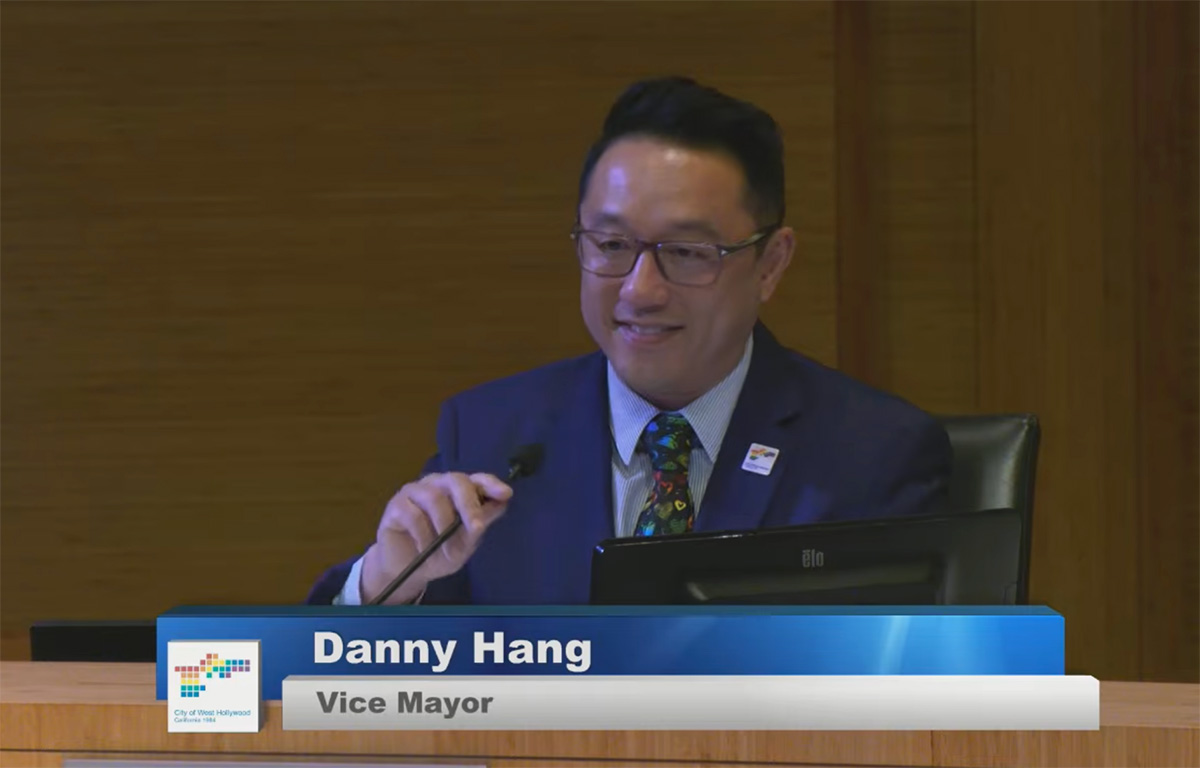
On Jan. 12, West Hollywood residents packed the City’s chambers at 6 p.m. to honor the work of outgoing mayor Chelsea Byers and witness councilmembers John Heilman and Danny Hang take their oath of office as they respectively assume their roles as Mayor and Vice Mayor for 2026.
In her last address as Mayor, Byers spoke about the optimism she holds onto in these unsteady times. To her, West Hollywood is a unique City: one that has become a model for what can be possible in an unjust society. “It’s us against the world. It’s West Hollywood on the stage,” Byers said. “It’s our story to tell, and every single person here contributes in such great ways to that.”
Byers was awarded a plaque on behalf of West Hollywood council members for her outspoken commitment to LGBTQ+ rights, economic justice, housing affordability, and policies that emphasize equity and inclusivity in West Hollywood.
Her leadership remains a bright, guiding light for Mayor Heilman, who was part of West Hollywood’s first city council after the independent city was incorporated in 1984. The spirit of that initial group remains today: queer, progressive, and led for and by the people. Yesterday’s ceremony marked the beginning of Heilman’s ninth time serving as Mayor, as well as his last year on the city council due to term limits.
Now, he leads side-by-side with a self-proclaimed “newcomer,” Danny Hang.
From the 626 to the Westside: Hang’s roots and journey
Hang was born in Monterey Park, a city in the San Gabriel Valley. The region is known for its diverse communities and AAPI-rich culture and history, and Hang recounted to the Blade the deep sense of belonging and comfort he felt growing up there. “I could go to a restaurant, speak Vietnamese or Chinese,” Hang said. “There are people who look like me out there. It is my home away from home.”
After college, he worked at the Social Security Administration, where he helped retirees, disabled people, and those impacted by loss file for Supplemental Security Income (SSI). The work was fulfilling, and he loved feeling that he had a tangible impact on others’ lives: that he could help residents grappling with difficult bureaucratic processes.
This passion grabbed the attention of L.A. County Supervisor Lindsey Horvath, who tapped Hang into serving on West Hollywood’s Disabilities Advisory Board in 2017. Hang eagerly accepted the role, having always been drawn to the vibrant, queer cultural hub. “WeHo was always the land of the unicorn: the land of magic,’ Hang told the Blade. “[This] was a town where I could be open, by myself, and find other people who were also LGBTQ+.”
After serving on the City’s Disabilities Advisory Board and, subsequently, the county’s Business License Commission, Hang noticed a lack of AAPI representation in local leadership. “There aren’t many AAPI people at all in West Hollywood. After I was on the commission, [I thought]: Hey, I think I want to run for city council,” Hang told the Blade.
Creating more inclusive leadership in WeHo
In 2024, Hang was elected to West Hollywood’s city council, becoming the first AAPI councilmember in the City’s 40 year legacy. “I want to see people who look like me in local government, because I want this community to be reflective of the modern-day people who live here. We’re a diverse community, and there’s no reason why we shouldn’t have people of color on the council, as well as more people of color appointed to our boards and commissions.”
Last night, local officials offered encouragement, support, and affirmation to Hang after he took his oath of office. “You’re already making history and certainly making waves across, not just your home region of the San Gabriel Valley, but certainly in California,” said Monterey Park councilmember Henry Lo.
Afterwards, Hang addressed the room, thanking residents, fellow council members and his family. “Standing here as the first AAPI elected to the West Hollywood City Council is deeply meaningful, and I couldn’t have done it without my parents. [They’re] right here in the front row,” Hang said. “My dad was a union worker, who showed me why standing up for workers matters. And my mom worked in a small business, owning a little nail salon in South Pasadena. She taught me what it means to care for others and to keep the community going.”
The year ahead: Heilman calls for residents to unite
Afterwards, Mayor Heilman spoke at length about the upcoming transitional year, the urgency of the current political climate, and ways that community members can step up to support each other. In his last term, he has set his eye on revitalizing the Sunset Strip, stabilizing rent and increasing housing affordability as well as examining the safety of the City’s foundational buildings, including the library and fire station.
He concluded his speech by making an unwavering stance on the “appalling” state of the federal government, stating that every West Hollywood resident must step up together in the face of ongoing federal attacks on the rights of LGBTQ+ people, specifically transgender people, as well as immigrants and other marginalized community members.
“This is a direct attack on our residents. It’s a direct attack on all of us,” Heilman said. “Now is not the time to hide. We need you…Ask what you can do to help people in the community,” he said, galvanizing residents to volunteer for the City’s various social services, nonprofits like Hollywood Food Coalition and Ascencia.
This call for unity and communal bravery echoes Byers’ belief in the courage of the people of West Hollywood. “41 years ago, a group of people defined what government could be,” Byers said. “We’re living the wildest dreams of people decades ago…and we get to be a bridge for that hope for the future. In such a critical moment, it’s truly our responsibility.”
Kristie Song is a California Local News Fellow placed with the Los Angeles Blade. The California Local News Fellowship is a state-funded initiative to support and strengthen local news reporting. Learn more about it at fellowships.journalism.berkeley.edu/cafellows.
West Hollywood
Administration refused to honor World AIDS Day; residents gathered with defiance, grief and love
Yesterday, members of the APLA Health Writers Group read moving stories to a large group of locals gathered at the AIDS monument.
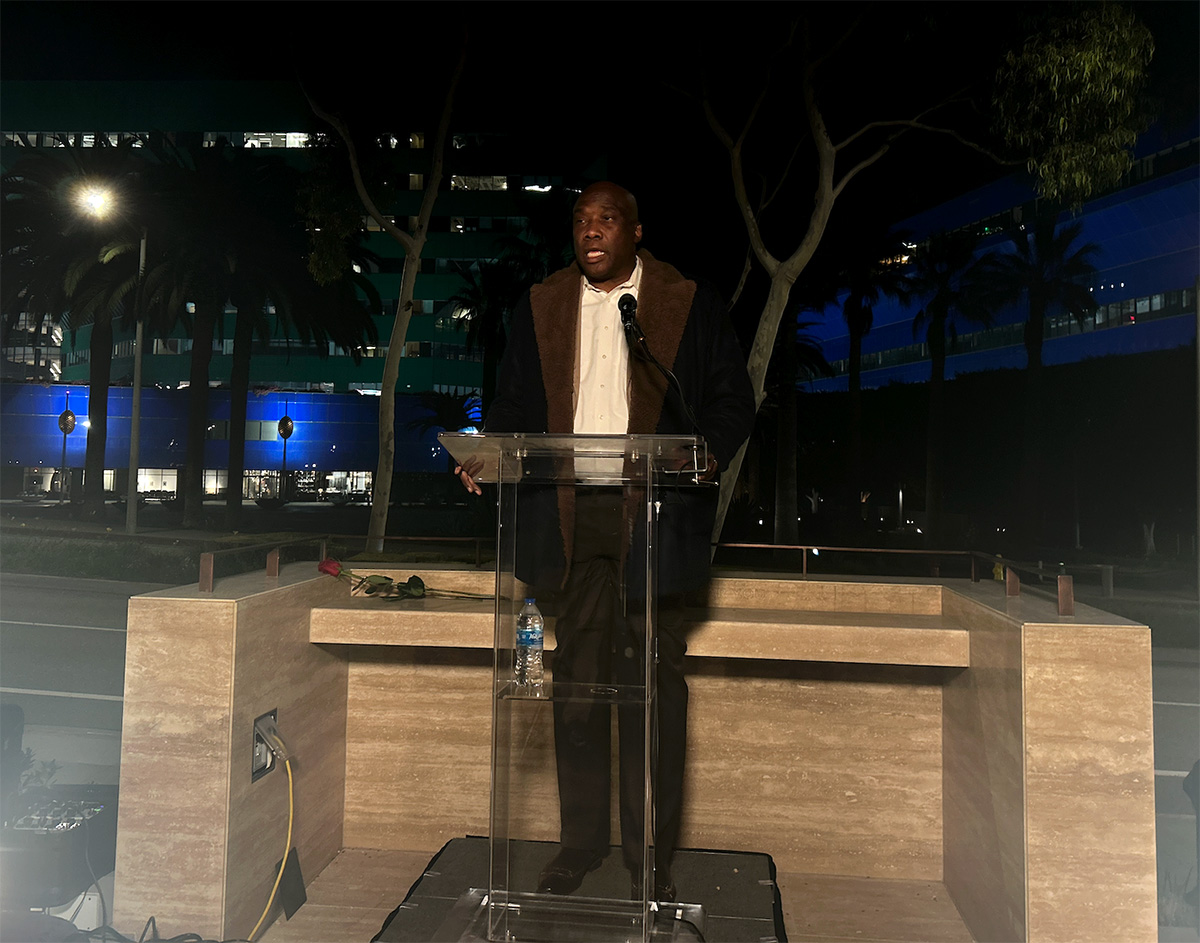
On Monday, the federal administration did not honor World AIDS Day, for the first time since the international awareness day was created in 1988. In addition to significant funding cuts to organizations focusing on HIV preventative treatment and care, the government’s halting of this commemoration perpetuates a dismissive system of inaction against LGBTQ+ people.
And yet, over 50 community members filled the empty spaces of West Hollywood’s AIDS monument yesterday evening, waiting in the night chill as city officials delivered impassioned statements and writers from APLA Health read personal pieces that centered a grief and love for those lost to the epidemic.
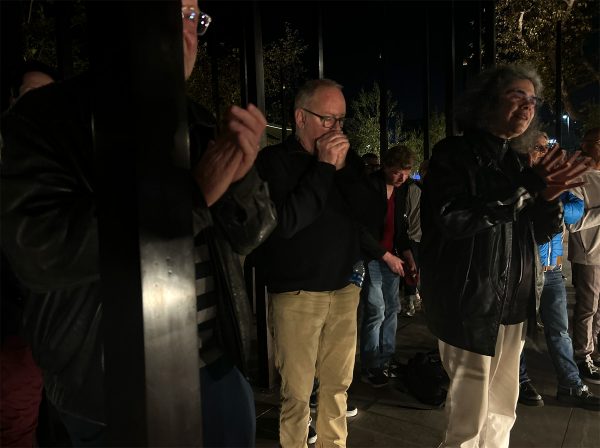
Before the readings began last night, West Hollywood vice mayor John Heilman asked for residents to join him in a righteous rage against administrative apathy. “I want to ask us all to reflect for just a moment about all of the people we lost…I want us to reflect and get angry,” said Heilman. “We have a fucking president who won’t even recognize World AIDS Day.”
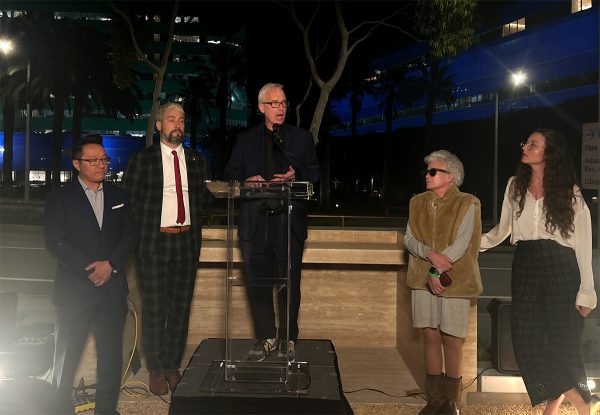
Irwin Rappaport, board chair for STORIES: the AIDS monument, echoed this immense disappointment. “Many of us here tonight lived through the 1980s, so we know what that’s like,” Rappaport said. “We also know that because of that neglect, because of that lack of caring from the federal government, we have to care for one another — and we know how to do that. When we don’t have recognition from others, we know how important it is to preserve our own history, to tell our own stories.”
Through heavy silence, five writers from APLA Health’s writers group stood tall before a podium and shared intimate writings they created about the epidemic and its personal impact on them. The collective was established in 1989 to provide an inclusive, expressive space for HIV-positive writers and allies to work on their writing and learn how to share their stories.
Writer Brian Sonia Wallace, who served as West Hollywood’s poet laureate from 2020 to 2023, has been working with the writers group for the last four years to help them hone and refine their narrative voices as they share their heaviest grief and the depths of their love for the people they lost to HIV and AIDS.
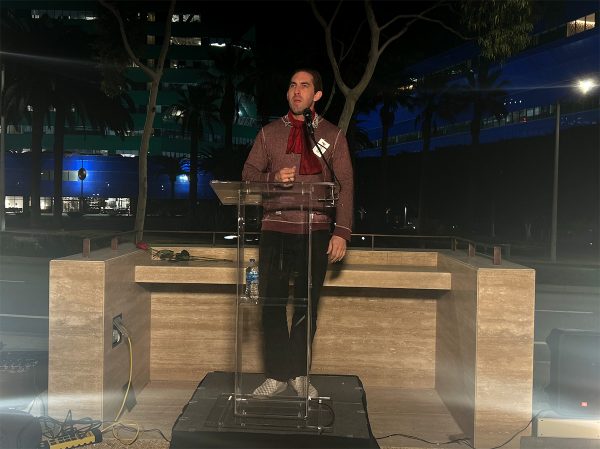
Hank Henderson, one of these writers, read from a diary entry from November 29, 1991. His voice, clear and strong, wavered as he shared about the death of his dear friend Richard. In a piece filled with lush, rich detail, painted clearly with a strong and loving voice, Henderson recounted a memory with Richard during the latter’s last years.
“The Santa Barbara sky is clear blue forever today…Yesterday came and went like a half-remembered dream between snooze alarms,” Henderson recited. “Last year, we walked to the beach. We spent hours there, played frisbee ourselves, brought the dog. Richard even yelled out 30-minute tanning turnover alarms. Yesterday, he took tiny, labored steps back to the car, used my shoulder to keep himself from falling over. Nobody said anything. We just pretend it’s normal.”
Another writer, Austin Nation, shared the story of being told he was HIV-positive at 26 years old. As a young nurse, he remembered the shock of seeing “young, beautiful men” arriving at the hospital covered in “purple, blotchy sores.” When he received his own test results, a paralyzing terror washed over his body. An incredulity followed the fear: why was this happening to him? “I got this thing for what?” Nation spoke. ”For having fun? For making love? And now it’s gonna cost me my life?”
But as he stood before the crowd, now 63 years old, he was met with applause and joy as he stated and repeated: “I’m still here. I’m still here.” The writers, in their grief and loss, have come to a place where they are able to share these stories, empowered and held. “In a world that writes off people with stories like mine,” Nation said. “It’s a hell of a good day to be alive.”
Kristie Song is a California Local News Fellow placed with the Los Angeles Blade. The California Local News Fellowship is a state-funded initiative to support and strengthen local news reporting. Learn more about it at fellowships.journalism.berkeley.edu/cafellows.
West Hollywood
West Hollywood kicks off community-focused programming for World AIDS Day
Since 1988, queer communities have come together on Dec. 1st to honor siblings and allies lost to the AIDS epidemic.
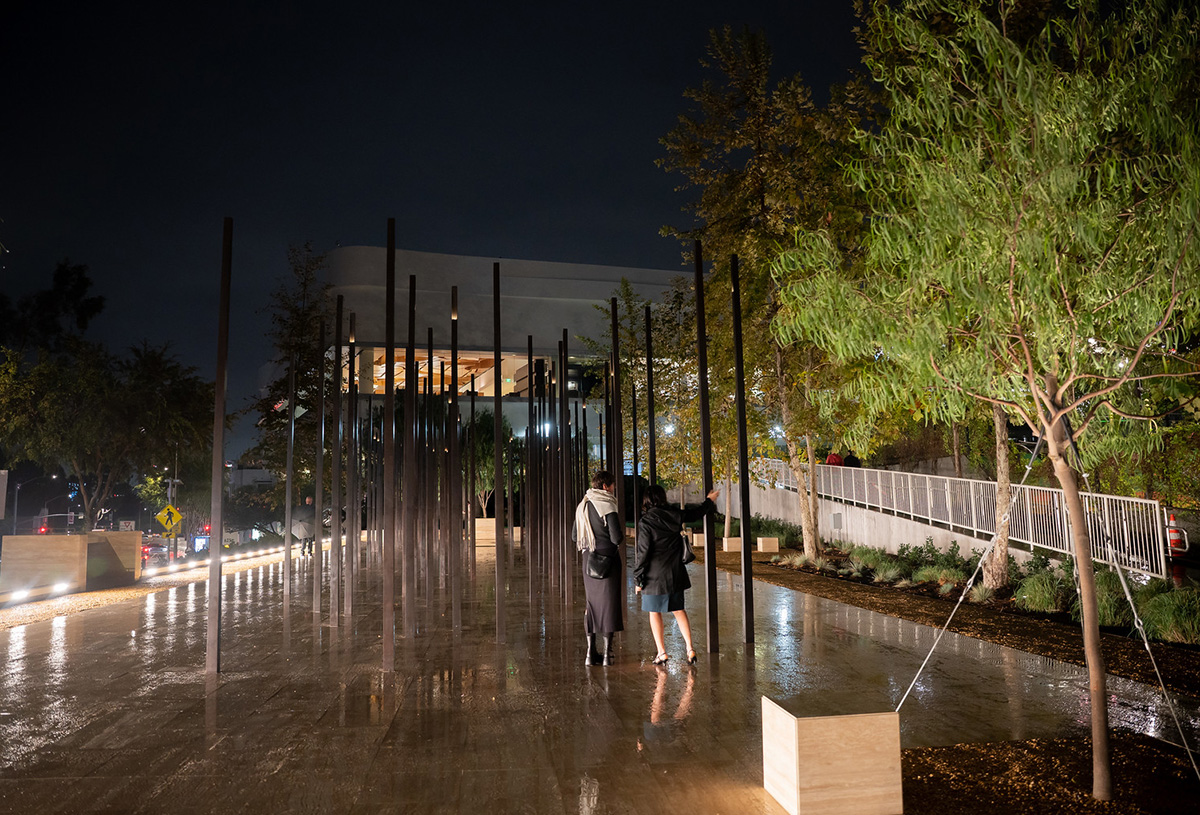
Since 1988, LGBTQ+ communities have come together on Dec. 1st to commemorate queer siblings and allies lost to the AIDS epidemic. This year’s World AIDS Day follows the theme “Overcoming disruption, transforming the AIDS response” and highlights the substantial funding cuts to research, health services, and community initiatives that have prioritized the safety of people with HIV and AIDS. The theme challenges people to think about “radical” ways to organize together and ensure that those who are impacted are able to access the care, treatment, and awareness that they need.
Beginning today, the City of West Hollywood is kicking off programming to recognize the historical transformation that local queer communities experienced during the AIDS epidemic. A panel from the AIDS Memorial Quilt will be available for viewing at the City’s Council Chambers at 625 N. San Vicente Boulevard through Monday, Dec. 15th.
Known as the largest community arts project in history, the Quilt is a powerful memorialization of loved ones who died during the epidemic. Each panel of the Quilt contains a story of remembrance, immortalizing a life cut short during the crisis. The project currently contains over 50,000 panels dedicated to over 110,000 people, all woven together in a 54-ton tapestry piece.
If you’re visiting the panel today, there will be an additional gathering opportunity tonight at the West Hollywood Park for STORIES: the AIDS Monument. From 5:30 to 8:30 p.m., members from the HIV-positive writers collective APLA Health Writers Group will present intimate readings that reflect on their experiences. Community members will be allowed time to wander through the monument and also preview the new Herb Ritts: Allies & Icons exhibition at ONE Gallery after the program. The art show includes striking black and white portraits of activists who stood in alliance with those most impacted during the AIDS epidemic.
Additionally, fresh flowers will be placed on the bronze plaques that line the City’s AIDS Memorial Walk. During the AIDS epidemic, West Hollywood was at the center of a rampant grief and loss that juxtaposed vibrant programming and efforts that boosted healing and fought against stigma and violence. It continues to be a vibrant space that houses various organizations and memorial spots that continue to uphold the revolutionary history and advocacy work that has continued since the epidemic’s beginnings.
Today, West Hollywood is in the process of executing its HIV Zero Strategic Plan, an initiative that began in 2015. Its goals include: expanding healthcare access for people living with HIV and AIDS, reducing the rate of infections, lessening health disparities and inequities for those impacted, and slowing the disease’s progress from advancing to AIDS.
According to West Hollywood mayor Chelsea Byers at a recent Cityhood event, the initiative carries forth the City’s “bold vision” and commitment to ensuring marginalized community members living with HIV do not face the life-threatening discrimination and health barriers that their elders experienced.
To learn more about the City’s programming, read here.
Kristie Song is a California Local News Fellow placed with the Los Angeles Blade. The California Local News Fellowship is a state-funded initiative to support and strengthen local news reporting. Learn more about it at fellowships.journalism.berkeley.edu/cafellows.
West Hollywood
Today, West Hollywood celebrates 41 years of queer cityhood
WeHo’s city officials are trying to preserve the fight for queer safety and rights that began decades before.
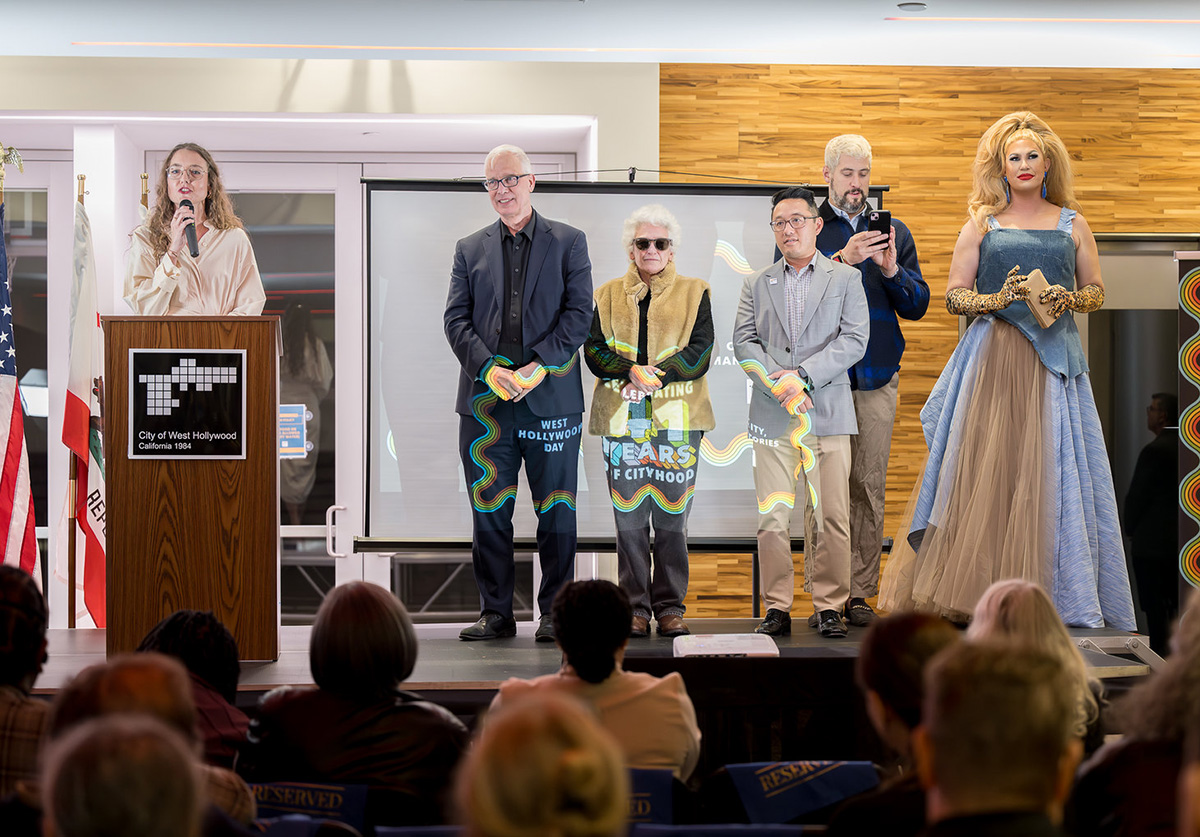
On Nov. 29th, 1984, West Hollywood was incorporated as an independent City, making its sovereignty official and solidifying it further as a sanctuary for LGBTQ+ community members, their stories, and their freedoms. Inspired by other prominent gay neighborhoods like New York’s West Village and San Francisco’s Castro District, West Hollywood was established by local queer advocates and residents. Their first city council was made up of a majority gay governing body — the first in the world, according to the West Hollywood History Center.
This political legacy, and the city’s vibrant and proudly queer history, continues to be preserved. On Monday’s celebratory event, West Hollywood mayor Chelsea Byers announced that the City’s current council “continues to be a majority-LGBTQ+ body,” holding tightly onto a “spirit” that reflects, prioritizes, and fights for Los Angeles’ queer community.
West Hollywood has been through various transformations, cocooning and revitalizing itself through the country’s evolving political and cultural upheavals. It has long been home to a ravishing nightlife that celebrates LGBTQ+ expression, and was a focal point for queer-led liberation and activism in the late 1960s and early 1970s. Trailblazers like Morris Kight led the first gay pride march through West Hollywood’s streets in 1970 and opened the Los Angeles LGBT Center to nourish the City’s robust and blossoming queer communities.
Today, West Hollywood continues to be the place where queer organizers and residents plant roots. Earlier this month, STORIES: the AIDS monument opened up in the City’s park after over a decade of work, shining a light on the legacies of gay activists, artists, historians, and community members who fought to survive as anti-gay stigma led to the erasure of their rights and lives.
As waves of anti-LGBTQ+ hate and violence continue to surge through the country, West Hollywood elected officials aim to continue doing the critical work that began decades before them: the work that protects the ability of queer residents to advocate for themselves, to live with protections and dignity, and to relish in joy. Mayor Byers is inspired by the resilience of the community members who stood together to establish this independent City in 1984. “The people who lived here…wanted a city with strong protections for renters, with progressive policies, and with a local government that would actually reflect and protect the people who call this place home,” said Byers, at the Nov. 24th celebration.
Over 40 years later, these needs have not changed. The way forward? Remembering and fighting for that initial promise and hope. “We are a chorus. We are a tapestry,” said Byers. “We are the product of thousands of people who, for more than four decades, have dared to say: We can build something better here.”
Kristie Song is a California Local News Fellow placed with the Los Angeles Blade. The California Local News Fellowship is a state-funded initiative to support and strengthen local news reporting. Learn more about it at fellowships.journalism.berkeley.edu/cafellows.
West Hollywood
From nickname to reality, the Rainbow District is made official by the City of West Hollywood
The mile along Santa Monica Boulevard from N. Doheny Drive to N. La Cienega Boulevard welcomes residents and visitors to come as they are
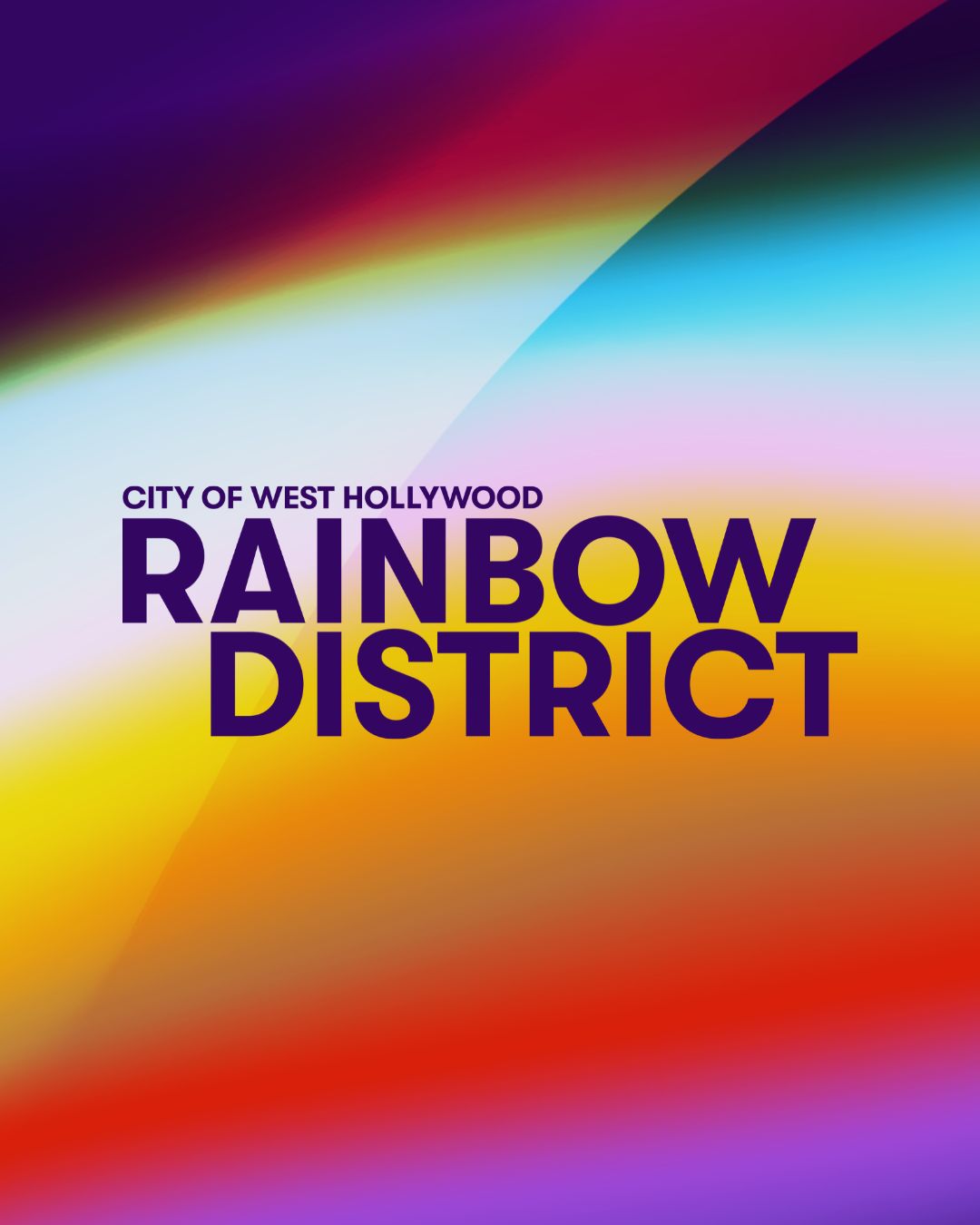
Even in today’s political climate, we will not be hidden.
The vibrant stretch on Santa Monica Blvd of over 50 local businesses, representing the full spectrum of LGBTQ+ expression, from N Doheny Dr to N La Cienega, has had the loving nickname of the Rainbow District for decades. Well, now it’s official. From nightlife to restaurants to community organizations, the City of West Hollywood has formally designated the space as such, honoring the neighborhood’s legacy as a safe haven for the queer community and beyond.
In addition to making the name official, the Rainbow District is being launched with a full range of social media, including Instagram, TikTok, and Facebook, keeping the residents and visitors updated on all upcoming events and happenings in the neighborhood.
Long known as a beacon of acceptance, inclusion, and visibility, where everyone is welcome, this iconic mile-long corridor is now formally recognized for what it has always been: a place where people from every walk of life can come together, be themselves, and celebrate the beauty of diversity.
City of West Hollywood Mayor Chelsea Lee Byers states, “For generations, the City of West Hollywood’s Rainbow District has been a place where LGBTQ+ people take their first steps into living openly, where the warm embrace of community is found at every turn, and where the joy of living out, loud, and proud fills the streets. The City’s official designation of the Rainbow District honors both the legacy and the future of this vibrant neighborhood, home to beloved entertainment venues, bars, and restaurants that have long served as cornerstones of LGBTQ+ life. Today, the Rainbow District is more alive than ever, and it will always stand as a beacon of hope, pride, and belonging and as a reminder that everyone deserves a place to celebrate joy, to be seen, and to be supported.”
The Rainbow District officially joins a nationwide list of iconic LGBTQ+ landmarks. West Hollywood will not be hidden amid political backlash and will continue to protect queer spaces, uplift queer voices, and foster a safe and joyful environment for all.
“This designation is not only a celebration, but it also serves as a promise,” said Visit West Hollywood President & CEO Tom Kiely. “A promise to keep LGBTQ+ spaces visible, valued, and vibrant for generations to come. As the Rainbow District continues to evolve, it will remain a place where locals and visitors alike can connect through culture, creativity, and community. The City’s formal designation affirms its significance and highlights The Rainbow District as the ultimate playground for travelers seeking a unique, inclusive, and authentic experience.”
The Rainbow District will be home to upcoming community events that include:
- Winter Market & Ice Skating Rink — December 2025
- Go-Go Dancer Appreciation Day — March 2026
- Harvey Milk Day — May 22, 2026
- WeHo Pride Weekend & the OUTLOUD Music Festival at WeHo Pride — June 5–7, 2026
Follow the Rainbow District on socials to discover local happenings, support small businesses, and be part of a neighborhood that celebrates every person for exactly who they are.
Instagram: @RainbowDistrictWeHo TikTok: @RainbowDistrictWeHo
Facebook: facebook.com/rainbowdistrictweho More Info: visitwesthollywood.com/rainbowdistrict
West Hollywood
West Hollywood’s AIDS Monument preserves the pain and power of people lost to the crisis
STORIES: The AIDS Monument is now available to view at West Hollywood Park, 15 years after its conception.
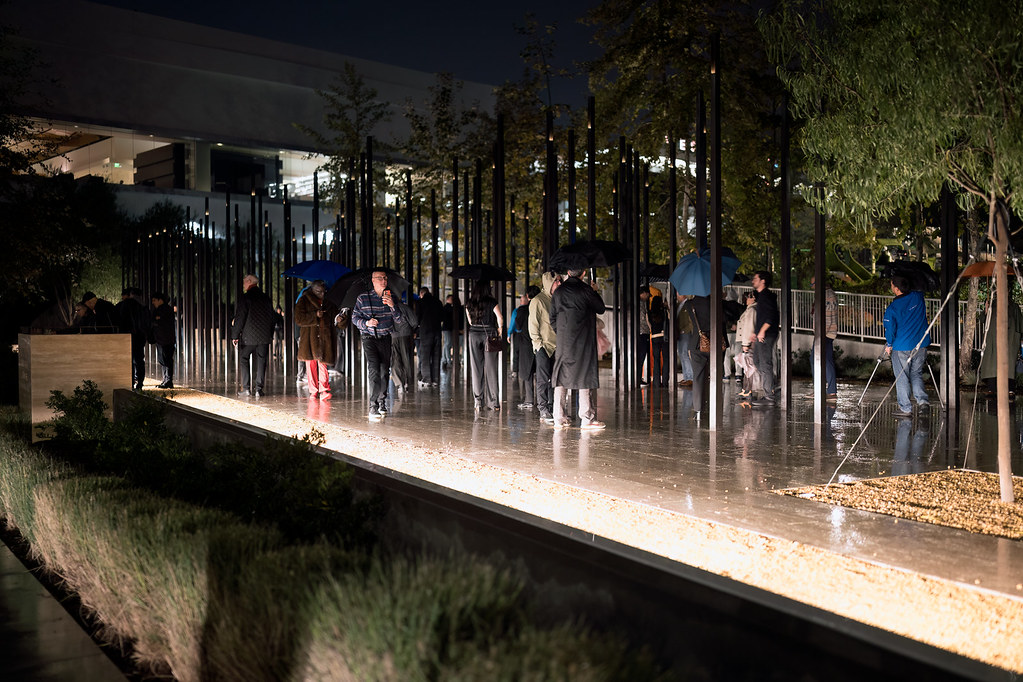
It was 1985, at the height of the AIDS crisis, when Irwin Rappaport came out as gay. As he came to terms with his identity, he witnessed people around him grow weaker: their faces becoming gaunt, painful lesions developing on their bodies. Five years later, he began volunteering as a young lawyer at the Whitman-Walker Clinic, a community health hotspot in Washington, D.C. that created the first AIDS hotline in the city, opened homes for patients with AIDS, and distributed materials that promoted safe sex.
The work being done at the clinic was instrumental, essential, and deeply painful. “When you see that sickness and experience that death among your friends and people you know, and when you’re writing wills for people who are much too young in ordinary times — it has an impact,” Rappaport told the Blade. “And even though in 1996 we saw life-saving medications come around, you never forget the sense of fear that permeates your life. The sense of loss.”
Determined to honor and share the legacies of people who died from AIDS, Rappaport joined the Foundation for the AIDS Monument (FAM) board to work towards the organization’s goal of creating a physical monument dedicated to memorializing these histories. FAM treasurer Craig Dougherty first conceived of this project in 2010 and, after 15 years, STORIES: The AIDS Monument is now available to the public for viewing.
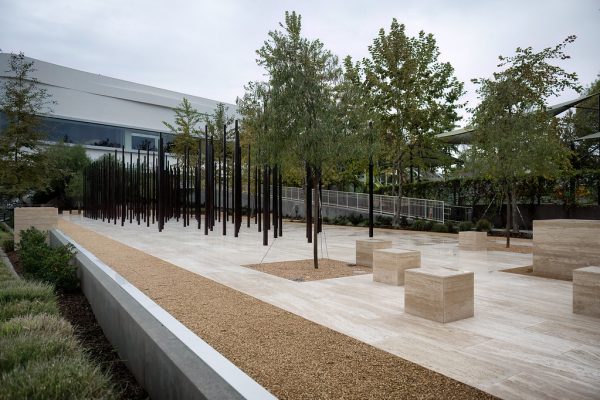
Created in collaboration with the City of West Hollywood, STORIES: The AIDS Monument is composed of 147 vertical bronze pillars known as “traces.” Designed by artist Daniel Tobin, 30 of these traces are engraved with words like: activism, isolation, compassion, and loss, which correlate to the over 125 audio stories collected and archived on the foundation’s website. This multimodal storytelling allows people who come across the monument to engage more intimately with the people represented by these physical pillars.
At nighttime, lights transform the monument into a candlelight vigil, providing a warm glow to a wanderer’s journey through the structure.
When people were able to walk around the traces at Sunday’s grand opening ceremony at the Pacific Design Center, the last remnants of the weekend’s rainstorm created a kind of “spiritual” and reverent atmosphere for those gathering, according to Rappaport. “I think there’s a certain peacefulness and serenity about the design, an opportunity for reflection,” he continued. “For some, it may bring back incredibly painful memories. It might bring back wonderful times with friends who are no longer here. It might remind them of their own caregiving or activism, or the sense of community that they felt in striving with others to get more attention to the disease.”
Now that the monument has been built, FAM has passed the mantle of management and programming to One Institute, a nonprofit that engages community members with queer history through panels, screenings, and other educational initiatives. One Institute plans to host monthly docent tours, art installations, and other special events during various LGBTQ+ national awareness days, including the upcoming World AIDS Day in December.
Rappaport also hopes to do outreach with local schools, so that young students are able to engage with the monument, learn about the people who were affected by the AIDS crisis, and interact with the ripples of transformation that this time period sparked in politics, research, the arts, and within society. “For younger people, I think [this is] an invitation for them to understand how they can organize about issues that they care about,” Rappaport said. “[So] they can see what the HIV and AIDS community did as a model for what they can do to organize and change the world, change culture, change law, change politics, change whatever they think needs to be changed. Because we had no other choice, right?”
West Hollywood
West Hollywood invests $1 million to build LGBTQ+ Olympic hospitality house
Pride House LA/WeHo will be an interactive space for queer athletes and allies to celebrate the 2028 Summer Games together.
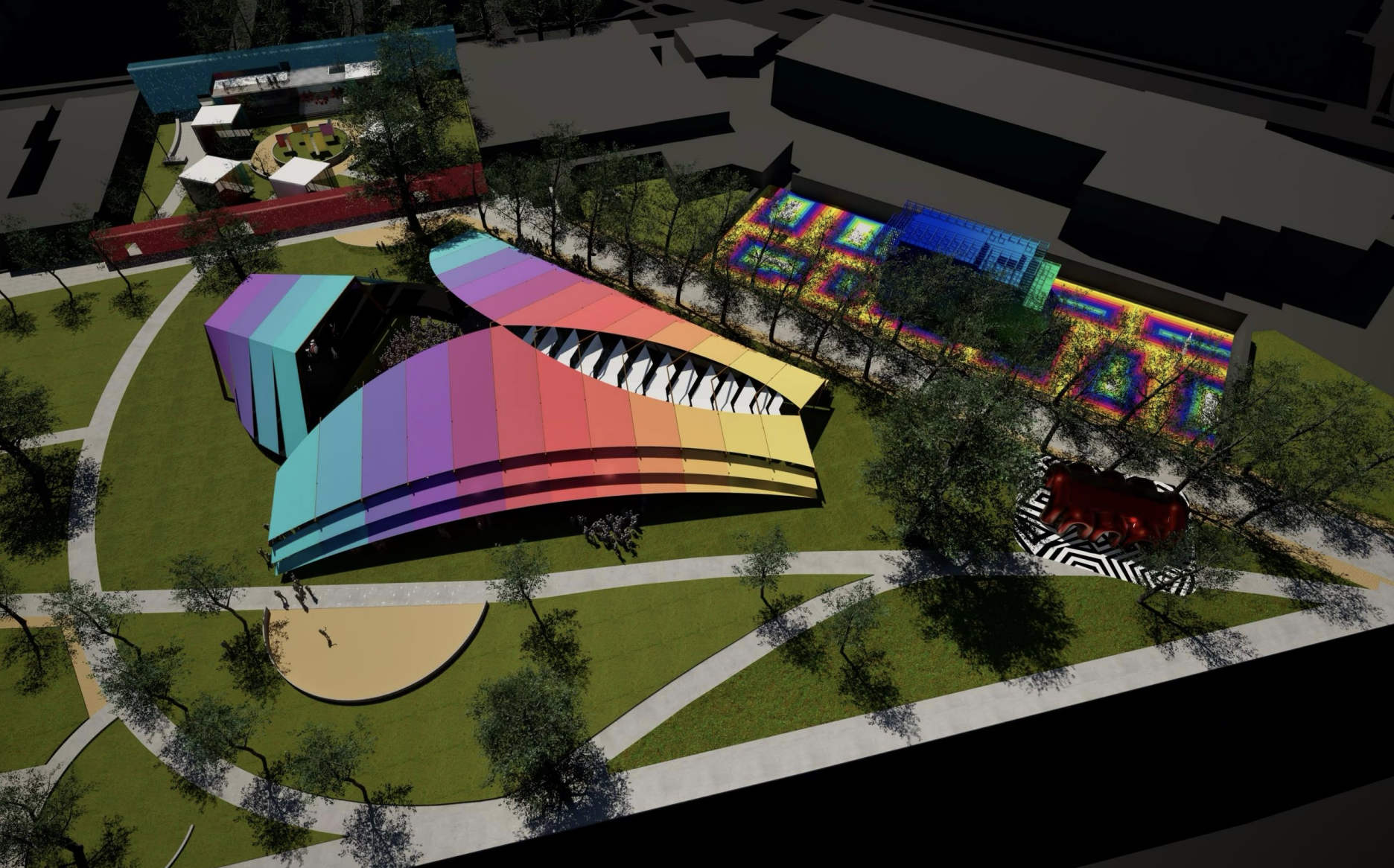
The first-ever Olympic hospitality house began with humble roots in 1992: a tent pitched on the Port of Barcelona for athletes to gather with their families. Since then, they transformed into fixtures of several major sporting events, with hopes of fostering belonging and safety for athletes of various cultural backgrounds.
It wasn’t until 2010 that the first LGBTQ+ hospitality house, the Pride House, appeared during the Winter Olympics in Vancouver. Over the years, its existence and visibility have faced barriers. During the 2014 Sochi Winter Olympic Games in Russia, Pride House International was denied from organizing its safe hub. The rejection was a blow to the visibility and safety that the organization was trying to promote and create for queer athletes. But this didn’t go unnoticed. International fans demonstrated quiet resistance, hosting remote Pride Houses in support of the Olympians who were barred from openly communing and celebrating together.
As Los Angeles prepares to host the Summer Olympics in July 2028, Pride House is coming back stronger than ever. In early October, the West Hollywood city council approved an agreement that would allocate $1 million to sponsor Pride House LA/WeHo as they prepare to build a temporary structure at West Hollywood Park for the 2028 Games. For 17 days, vibrant LGBTQ+ sports programming will fill the park’s grassy knolls.
Pride House LA/WeHo CEO Michael Ferrera detailed at a Nov. 1st Out Athlete Fund fundraising event that the team plans to build a concert stage to seat over 6,000 people. There will also be a museum that will take viewers through 100 years of queer Olympics history, viewing areas for people to watch the games, and a private athlete village for queer Olympians. “The dream of that is — imagine you’re an athlete from a country where you can’t be out,” said Ferrera. “You come here, and you can be safe and sound.”
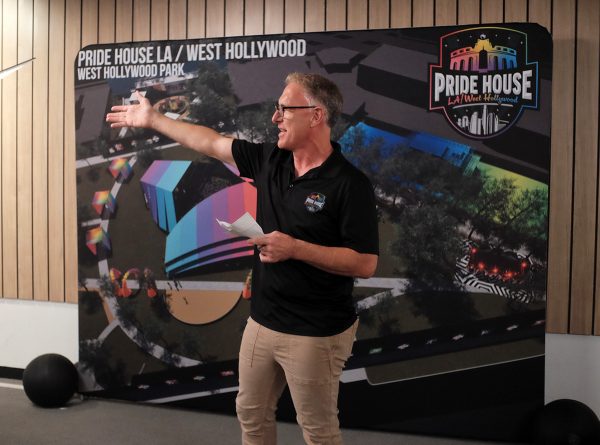
As outlined in the city council agreement and stated by Ferrera, most of the programming will be free and open to the public, and in the heart of a neighborhood that many of the county’s queer residents recognize as their safe haven. “We’re centering this important event in West Hollywood Park where our community has come together for decades in celebration, in protest, to support each other and to live our lives,” Pride House LA/WeHo CEO Michael Ferrera wrote to the Blade. “There is no place that is more representative of inclusion and safe spaces.”
The City of West Hollywood is promoting this inclusion further by asking for local community members to voice their perspectives on the formation of Pride House LA/WeHo at West Hollywood Park. On Monday, a community conversation will take place at Plummer Park to encourage residents to help shape the cultural programming that will take place in the summer of 2028. Another conversation will take place on Nov. 21st at the City’s 40th anniversary of Cityhood event.
“We couldn’t do this without the generosity and partnership of the city of West Hollywood,” Pride House LA/WeHo marketing co-lead Haley Caruso wrote to the Blade. “We are so happy to help bring the Olympic spirit to West Hollywood while also providing the community a safe and entertaining venue to enjoy the Games.”
Head to PrideHouseLAWeho.org for more information
West Hollywood
Drag performers delight Carnaval crowds with demure and daring dances
The Halloween party is one of the most anticipated events for queer Angelenos.
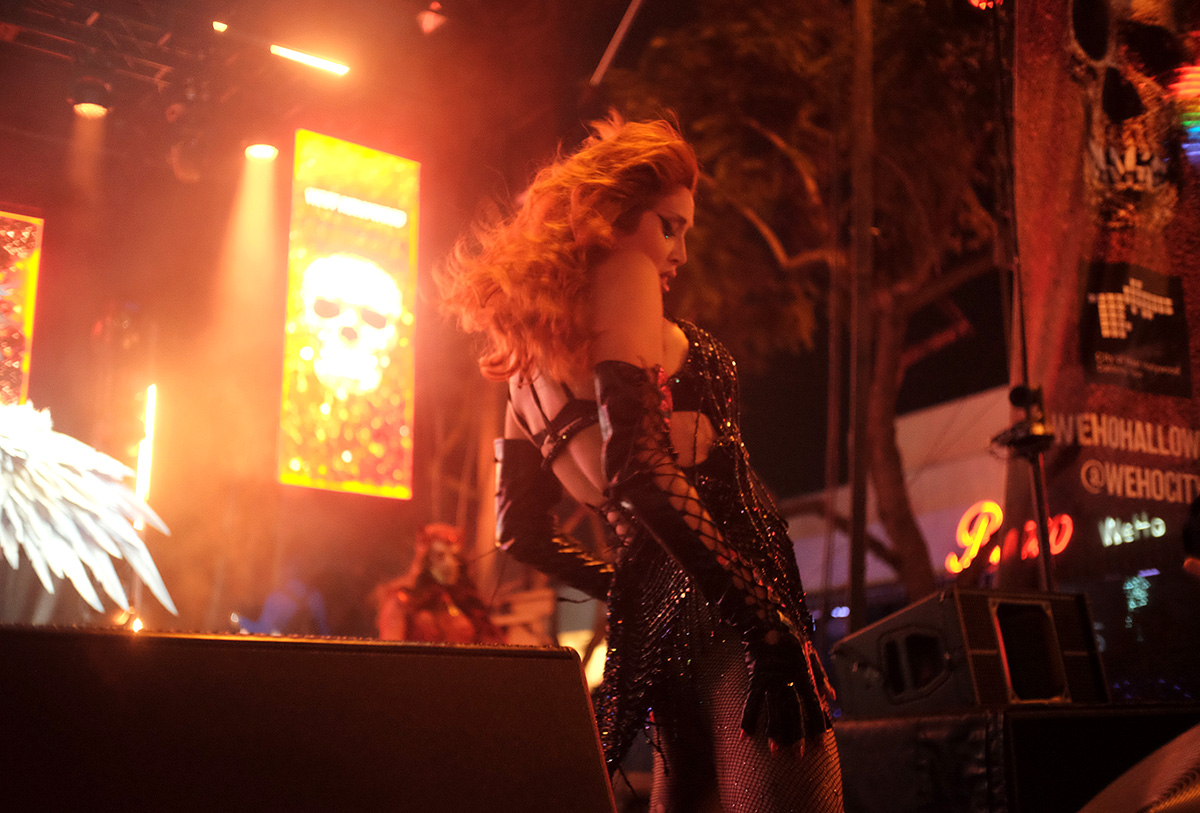
On Friday night, techno pop remixes surged through a tight block on Santa Monica Boulevard, where hundreds of eager partygoers danced near a pop-up stage. Bass-heavy grooves echoed across neighboring streets as Beetlejuices, angels, and vampires swayed and thumped to the beat.
Oct. 31 marked the arrival of West Hollywood’s annual Halloween Carnaval, one of the county’s citywide celebrations — and one of the most anticipated for queer Angelenos.
The first Halloween Carnaval was celebrated in 1987, and has since become one of the most awaited nights for local queer celebration. Drag performers donning elaborate costumes and glamorous makeup set the stage ablaze as they strutted, flipped their hair and danced to the cheers of a crowd that grew enormously as the night went on. The energy was infectious, and the Los Angeles Blade was on the scene to photograph some of these moments.
Image captures by Blade reporter Kristie Song.
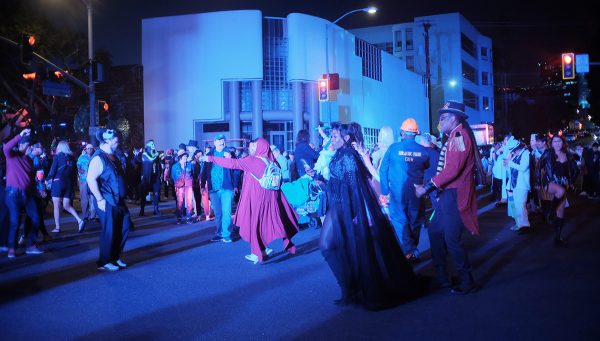
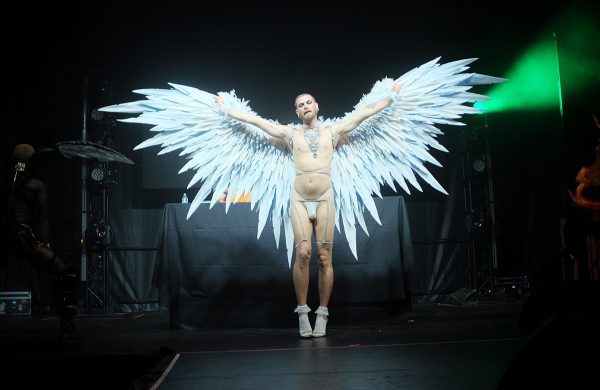
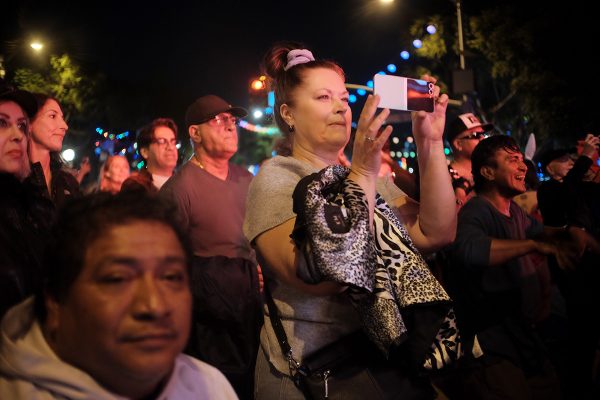
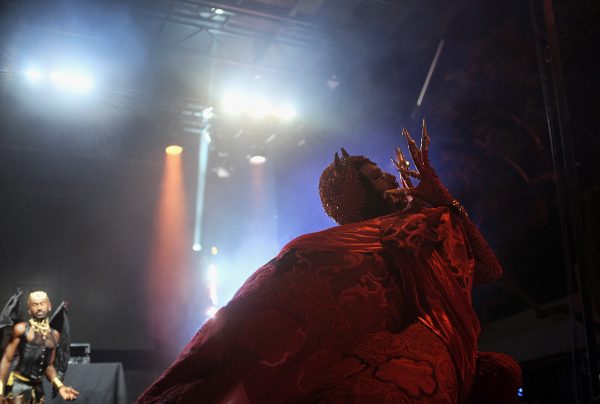
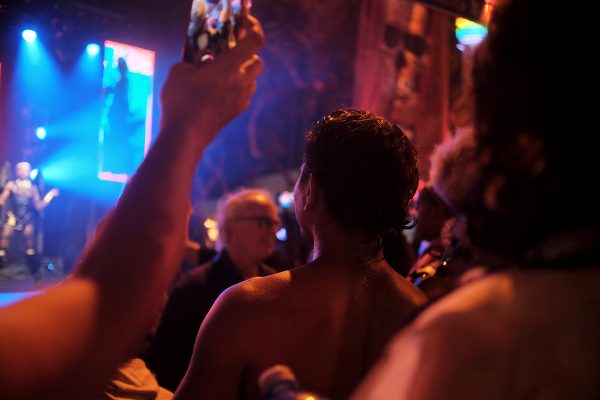
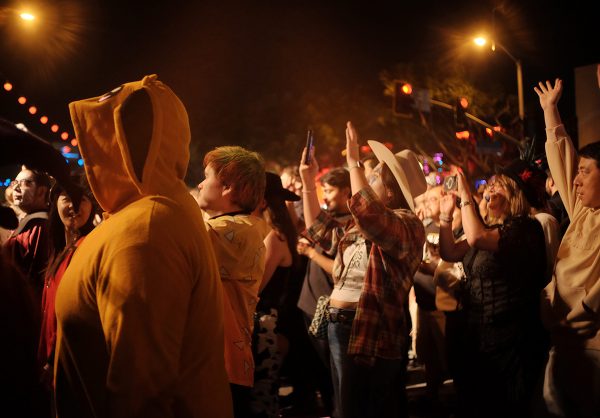
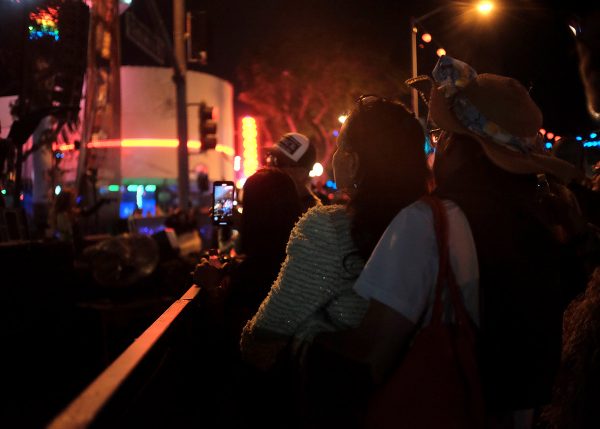
West Hollywood
West Hollywood installs new intersex pride flags on Intersex Awareness Day
On Sunday, city councilmembers gathered to raise two new pride flags to honor intersex community members
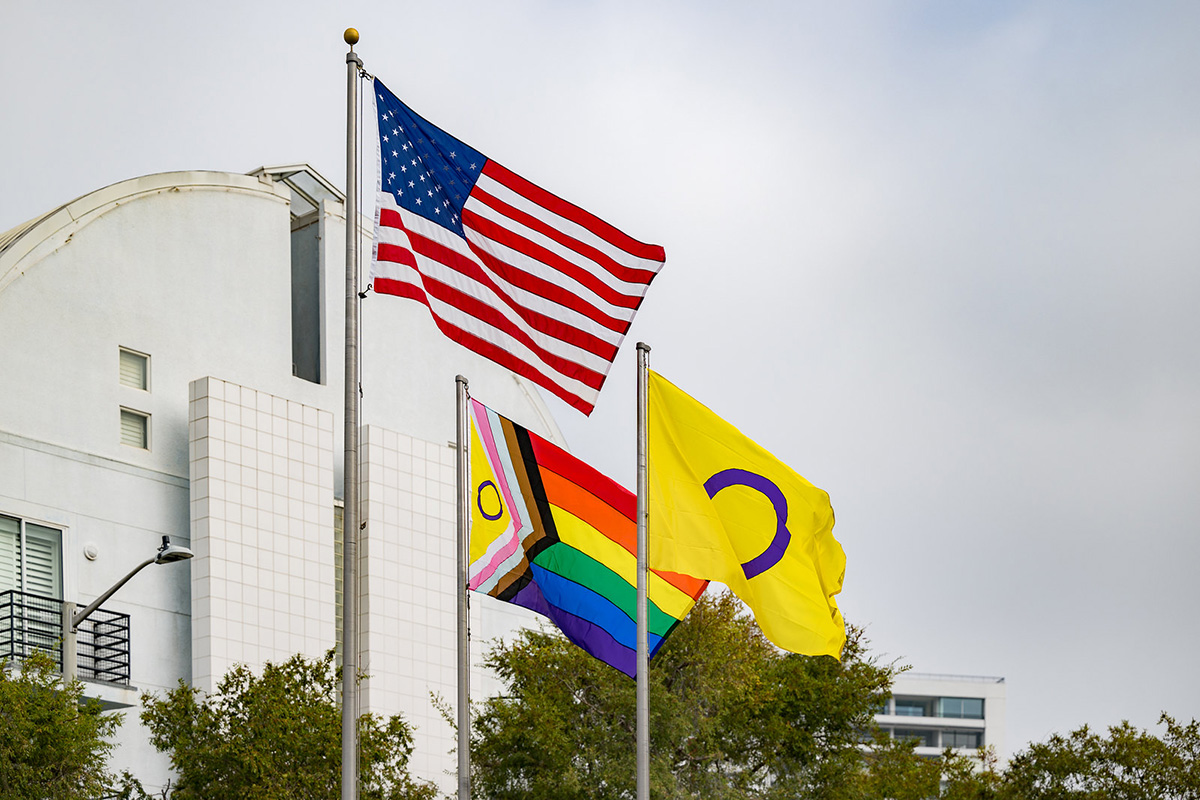
Early yesterday morning, on National Intersex Awareness Day, West Hollywood mayor Chelsea Byers, Vice Mayor John Heilman, as well as councilmembers Danny Hang and John M. Erickson gathered to install and raise two new intersex pride flags. They fly side by side with the American flag, upholding the City of West Hollywood’s vision of solidarity between national pride and LGBTQ+ visibility.
“We are facing unprecedented attacks on our community. It is important that we recognize the entirety of the LGBTQI+ community,” Vice Mayor John Heilman wrote to the Blade. “Intersex people have long been ignored and their issues disregarded. Raising the intersex flag also raises awareness about the challenges many intersex people face.”
Intersex people are born with naturally occurring variations in reproductive and sexual anatomy that don’t fit into binary “male” or “female” categorizations. As Planned Parenthood details, this can look like having both ovarian and testicular tissues or having combinations of chromosomes that aren’t “male” or “female,” just to name a few. According to the Human Rights Campaign Foundation, one of the biggest issues intersex people face is non-consensual surgeries performed when they are children. These operations are considered medically unnecessary and can leave lasting physical and psychological damage on intersex youth.
The fight for bodily autonomy and intersex visibility was the main reason behind the first action organized by intersex advocates and trans allies on Oct. 26th, 1996. Protestors stood outside the Boston Convention Centre, passed out leaflets, and spoke with clinicians, nurses, and other medical professionals attending the annual American Academy of Pediatrics conference.
One of the main leaders behind this movement was Morgan Holmes, an intersex woman who had experienced a violating medical procedure meant to “correct” her anatomy. In May of 1996, she presented testimony in a room adjacent to a symposium on genital surgery for intersex infants, a conference she and other members of her advocacy group had been rejected from.
“What I am saying is that my medical ‘care-givers’ failed to respect my autonomy or my intelligence when they assumed that because I was a child, they could do whatever they wanted as long as my father provided his consent,” Holmes said. “And when I began to balk, instead of questioning their own treatment of me, they blamed my body, and they cut it up.”
Today, intersex people and their stories are more broadly recognized, but still struggle to reach mainstream audiences when it comes to discussions around LGBTQ+ identity. West Hollywood city officials see this addition of intersex pride flags as a step forward. “Updating our city’s flags was my item because visibility matters,” councilmember John M. Erickson wrote to the Blade. “Intersex people have always been part of our story, and it’s time that their history, identity, and pride are recognized in the public spaces that belong to all of us.”
West Hollywood
Residents remain dubious as officials claim “no ICE involvement” at The Abbey
The Oct. 17th “undercover operation” was addressed at the latest city council meeting
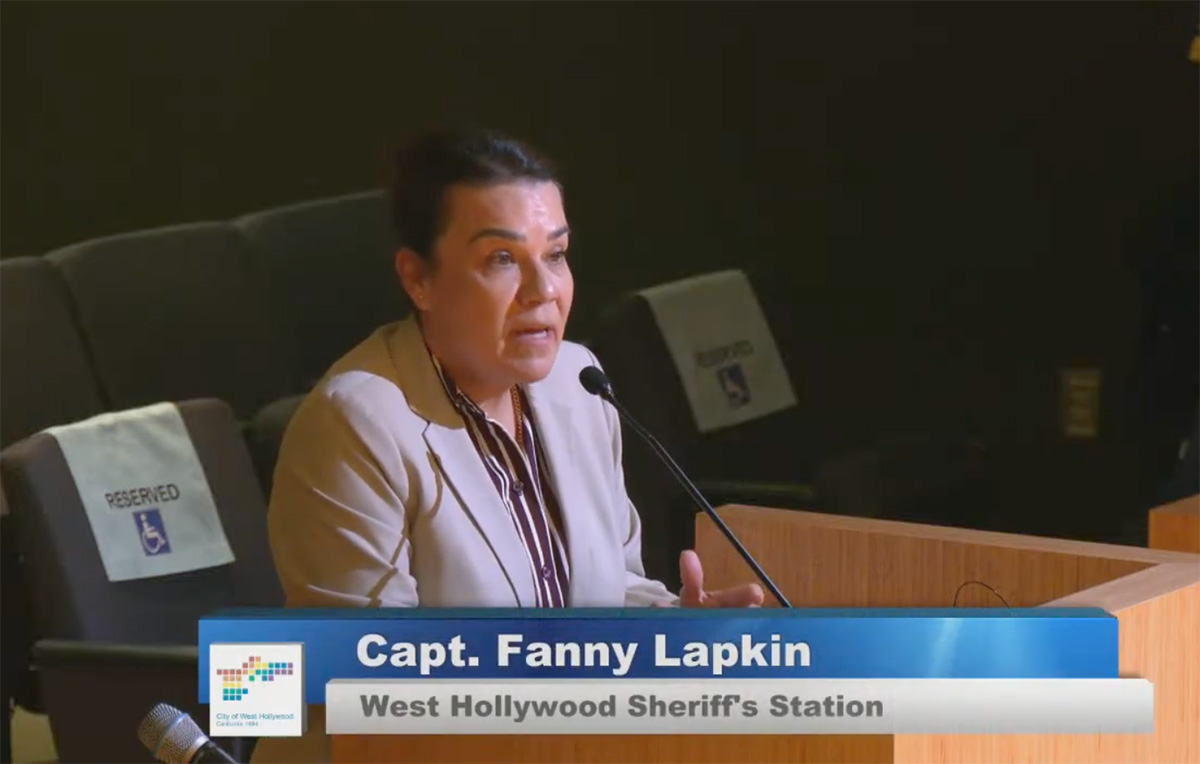
On Friday, Oct. 17th, West Hollywood gay bar The Abbey found itself in the center of a social media storm as clips were shared depicting the presumed presence of federal Immigration and Customs Enforcement (ICE) officers. In a video posted on Oct. 18th by Charles Hernandez, who often creates content around gay nightlife in Los Angeles, several people are seen standing in a line as they are apprehended and handcuffed by officers wearing sheriff’s vests and tees. Hernandez noted that, while dressed in varying attire with the word “sheriff” on it, none of the officers were willing to identify themselves or present their badges upon request.
Hernandez can be heard asking the officers about the cause for arrest, to which one responded: “I don’t have to tell you our cause.” The video creator also questioned another officer, who can be seen wearing a gaiter to cover his face. “Isn’t it illegal to wear a mask in California?” Hernandez asked. “He has COVID,” an officer replied. In September, Governor Newsom signed five bills that weakened federal agents’ abilities to access school sites and health facilities, and prohibited them from hiding their identities. More specifically, SB 627 requires all California law enforcement agencies to create written policies limiting their officers’ use of facial coverings by July 1, 2026.
As this video circulated around the web, the West Hollywood Sheriff’s Station released an online statement of their own, denying allegations that the officers present were federal immigration officers. The station also claimed that the night’s events were a result of an “undercover operation” that was conducted in response to reports made about pickpocketing and the transportation, use, and sale of illegal substances. “Several arrests were made,” the statement read. “ICE was not involved.”
Still, residents remained unconvinced, criticizing the station’s lack of transparency, careful conduct, and accountability. Over 50 people took to the comments of this statement to voice their discontent. “[It] was not that long ago when officers would raid LGBTQ spaces and arrest people simply for being there,” one comment read. “A raid such as this does not inspire feelings of safety for our community. Especially in times when people are being kidnapped off the street by masked federal agents. There simply must be a better response to pickpockets and “other criminal activity” than undercover raids by masked officers and transporting detainees in unmarked vehicles. DO BETTER.”
Two days later, at the West Hollywood city council meeting, West Hollywood Sheriff’s Station Captain Fanny Lapkin took to the podium to address some of these concerns. Echoing the station’s Instagram statement, Lapkin confirmed that the “pre-planned operation” was created in response to “concerns from our businesses and our community in regards to the pickpocketing, to the narcotics, and also to the illegal vending and some of the criminal activity during illegal vending.” Lapkin also confirmed that no federal agents were present, stating that everyone who took part in the operation was “sheriff’s department personnel.” And because the arrests were made as part of a planned operation, Lapkin further stated that warrants were not “necessary.”
The events were discussed with brevity at the meeting, but community ire has not been dispelled. Several people continue to question the ethics of this undercover operation: Why were the individuals being arrested not clearly told the reason for their detainment? Why were unmarked vehicles present? Why conduct the operation in this way, as Los Angeles neighborhoods continue to stay on high alert over immigration raids? These questions remain unanswered as more specifics about the operation have yet to be released.
-

 Arts & Entertainment5 days ago
Arts & Entertainment5 days ago2026 Best of LGBTQ LA Finalist Voting
-

 Commentary5 days ago
Commentary5 days agoWhen optics matter more than harm: BAFTA, BBC, and editing solidarity while letting slurs slide on through
-

 California5 days ago
California5 days agoExperts discuss pathways forward as anti-trans violence continues to rise
-

 a&e features5 days ago
a&e features5 days agoRevry Co-Founder Damian Pelliccione on why we need ‘King of Drag’
-

 LGBTQ+ Youth Mental Health3 days ago
LGBTQ+ Youth Mental Health3 days agoFor queer youth, LGBTQ+ scholarships affirm their visibility and sense of possibility
-

 Books4 days ago
Books4 days agoThe social side of self-pleasure: Artist Jason Wimberly presents his newest book of photography, HOMOSOCIAL
-

 Books5 days ago
Books5 days agoNew book profiles LGBTQ+ Ukrainians, documents war experiences
-

 Obituary3 days ago
Obituary3 days agoAppreciating literature’s gay genius, Michael Silverblatt
-

 a&e features2 days ago
a&e features2 days agoTaylor Tookes wants you to be your own beauty standard
-

 Movies3 days ago
Movies3 days agoMoving doc ‘Come See Me’ is more than Oscar worthy



